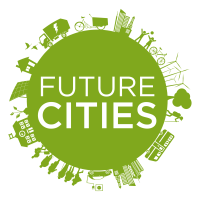The focus in CONCITO's Future Cities program is the leadership that cities in Denmark and globally must undertake for the green transition in the coming years. Efforts and solutions in cities will be crucial in achieving the objectives of the Paris Agreement. This requires ambitious, operational goals and concrete measures for both CO2 reduction and adaptation to climate change, which must be implemented in close cooperation with companies, citizens and authorities. However, climate action is not only a challenge. It is also an opportunity to create green, robust and livable cities.
Focus of the Future Cities program
The Future Cities program will continuously address climate challenges and potentials in cities with a dual focus on domestic and international action:
Globally: Focus on cities on a global scale and international urban networks with the aim of gathering knowledge on innovative solutions for green urban planning, production, consumption, transport and behavior. What can Danish and Nordic cities and municipalities learn from abroad?
Nationally: Danish cities and municipalities are well underway with the green transition, but how do they become front runners? We gather and document knowledge and tools that can support green leadership and climate action in Danish cities and municipalities. We also map and analyze relevance and appropriateness of specific Danish and Nordic solutions for international audiences and partners and both European and global levels.
Future mobility: We map and analyze how technological innovations such as electrification, automation and digitization are key to the development of the cities of the future.
Projects
DK2020 - climate action plans in all Danish municipalities
In the DK2020 project, Danish municipalities follow in the footsteps of the most climate-ambitious cities in the world. In a facilitated peer learning process, the municipalities develop ambitious climate action plans in line with the Paris Agreement.
All Danish municipalities are invited to become part of DK2020 due to a partnership between Realdania, KL – Local Government Denmark and the five Regions. CONCITO is project secretariat and knowledge partner for the three-year project, which is implemented in collaboration with C40 Cities and will be completed in mid-2023. It is a global first, that a country’s entire suite of municipalities sign up to adopt climate planning commitments in compliance with reaching the targets embedded in the Paris agreement.
The project is based on the experiences from a pilot project in which 20 Danish municipalities are in the process of developing climate action plans in line with the Paris agreement. As part of the pilot project, CONCITO has done a mapping of and written a report on climate action planning in all of the 98 municipalities in Denmark (in Danish with English summary). The pilot project started in May 2019 and will be completed in the beginning of 2021.
Please contact us if you want to hear more about our city program, have ideas for collaboration or know about interesting initiatives or solutions that we should look into.
PARCK – Partnership for Circular Municipalities
The municipalities play a unique role in the transition to a resource-efficient society, where more materials are being recycled. Therefore, a number of Danish municipalities are working together to boost the circular economy. The municipalities will test innovative solutions, methods, knowledge and results within the themes recycling, construction, business development, procurement and textiles.
Decarbonization of freight transport
The project aims to shed light on trends and solution perspectives in relation to a goal of decarbonizing the road freight transport sector by 2030 and 2050.
The focus is on engine and vehicle technologies, fuels and alternative fuels, as well as green organization of urban logistics. The project collects and discusses the latest international knowledge about the solution options with the road freight transport's key players in order to identify advantages and disadvantages of different decarbonization paths and develop actor-driven input on what Denmark must do to promote decarbonization.
The solution perspectives must be seen in particular in the light of how they can be concretely included in the design of future freight distribution and logistics in Danish urban areas. The project will therefore work with public and private actors in relation to the transport of goods in the Copenhagen area and other cities in the Nordic region and internationally.
The first report from the project was published in February 2020. The second report "Decarbonizing urban Logistics" was published in February 2021.
Action Plan for Research in Road Freight Transport
The project has been carried out for Nordic Energy Research and recommends how to organize research on road freight transport.
The analysis describes the current status of research in freight transport in the Nordic countries. Desk research of research results and ongoing research in the field has been carried out.
See the full report on Action Plan for Research in Road Freight Transport.
CONCITOs recommendations on how to strengthen research in road freight transport indicate the importance of focusing on the acceleration of the process towards implementation.
Cross-mobility
CONCITO participates in an Interreg project to improve mobility for the population in a sustainable way by integrating carpooling and flexible modes of transport into the mobility system.
The project involves a large number of municipalities, transport companies, research institutions, regions and companies. A number of demonstration projects are being carries out on carpooling and better mobility services in rural areas.
CONCITOs role is to look at how to organize and finance a mobility system that is based on sharing and flexible solutions. A mobility system that provides better mobility for citizens for the same economy and at the same time lower the emissions.

